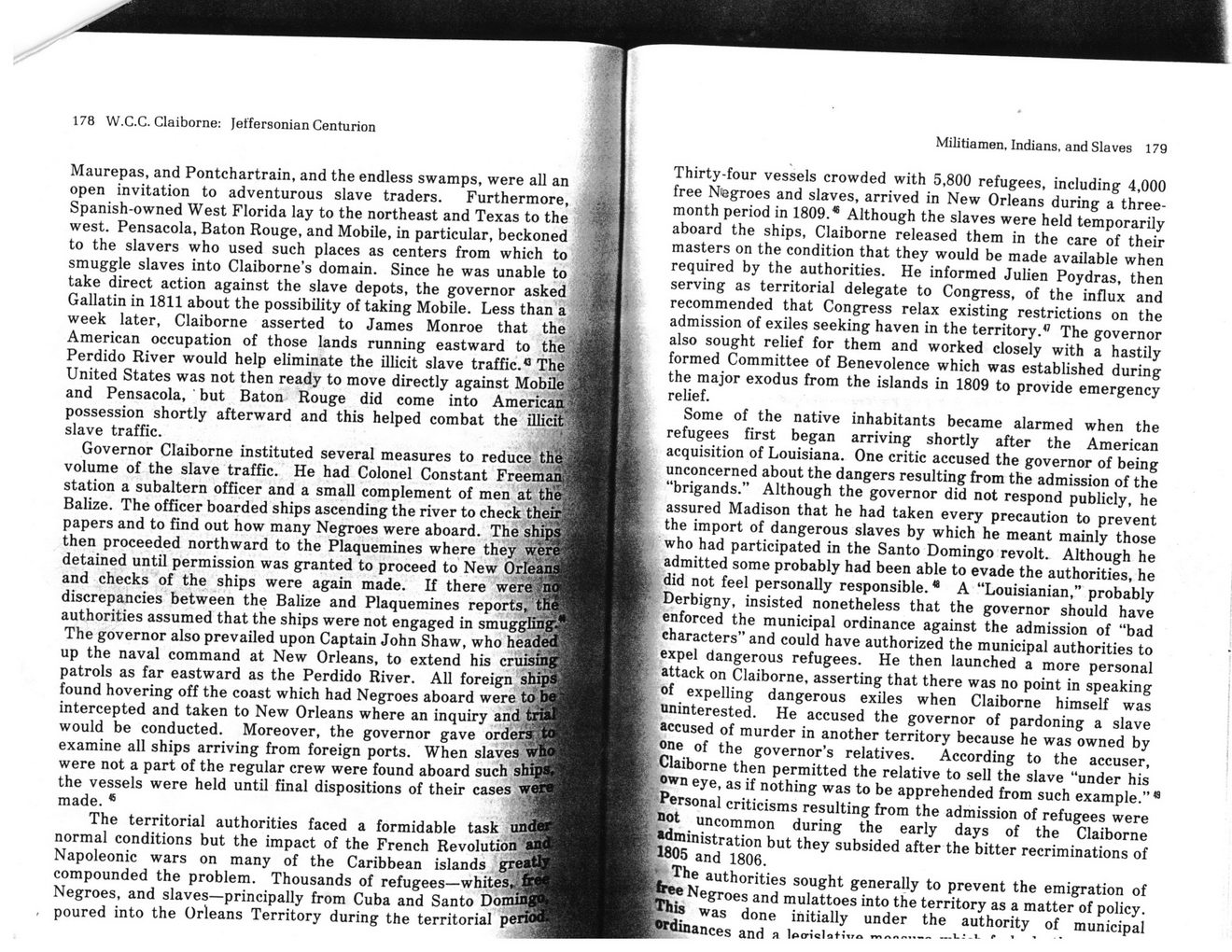This text was obtained via automated optical character recognition.
It has not been edited and may therefore contain several errors.
178 W.C.C. Claiborne: Jeffersonian Centurion Maurepas, and Pontchartrain, and the endless swamps, were all an open invitation to adventurous slave traders. Furthermore, Spanish-owned West Florida lay to the northeast and Texas to the west. Pensacola, Baton Rouge, and Mobile, in particular, beckoned to the slavers who used such places as centers from which to smuggle slaves into Claiborne’s domain. Since he was unable to take direct action against the slave depots, the governor asked Gallatin in 1811 about the possibility of taking Mobile. Less than a week later, Claiborne asserted to James Monroe that the American occupation of those lands running eastward to the j, Perdido River would help eliminate the illicit slave traffic.0 Theji United States was not then ready to move directly against Mobile f and Pensacola, but Baton Rouge did come into American^ possession shortly afterward and this helped combat the illicit.' -slave traffic. Governor Claiborne instituted several measures to reduce the^' volume of the slave traffic. He had Colonel Constant Freemans station a subaltern officer and a small complement of men at the|| Balize. The officer boarded ships ascending the river to check the*" papers and to find out how many Negroes were aboard. The shfa-^ then proceeded northward to the Plaquemines where they vtef detained until permission was granted to proceed to New Orlear and checks of the ships were again made. If there wer£fn discrepancies between the Balize and Plaquemines reports* tfi_. authorities assumed that the ships were not engaged in smuggling The governor also prevailed upon Captain John Shaw, who head up the naval command at New Orleans, to extend his cruisin patrols as far eastward as the Perdido River. All foreign ship found hovering off the coast which had Negroes aboard were to intercepted and taken to New Orleans where an inquiry and tr would be conducted. Moreover, the governor gave ordersjr-. examine all ships arriving from foreign ports. When slaves w ? were not a part of the regular crew were found aboard such sh the vessels were held until final dispositions of their cases w made. 45 The territorial authorities faced a formidable task un„ normal conditions but the impact of the French Revolution ’i Napoleonic wars on many of the Caribbean islands gre compounded the problem. Thousands of refugees—whites^ Negroes, and slaves—principally from Cuba and Santo DomL , poured into the Orleans Territory during the territorial pe Militiamen. Indians, and Slaves 179 Thirty-four vessels crowded with 5,800 refugees, including 4,000 free Negroes and slaves, arrived in New Orleans during a three-month period in 1809.* Although the slaves were held temporarily aboard the ships, Claiborne released them in the care of their masters on the condition that they would be made available when required by the authorities. He informed Julien Poydras, then serving as territorial delegate to Congress, of the influx and recommended that Congress relax existing restrictions on the admission of exiles seeking haven in the territory.47 The governor also sought relief for them and worked closely with a hastily formed Committee of Benevolence which was established during the major exodus from the islands in 1809 to provide emergency relief. Some of the native inhabitants became alarmed when the refugees first began arriving shortly after the American acquisition of Louisiana. One critic accused the governor of being unconcerned about the dangers resulting from the admission of the “brigands.” Although the governor did not respond publicly, he assured Madison that he had taken every precaution to prevent the import of dangerous slaves by which he meant mainly those who had participated in the Santo Domingo revolt. Although he admitted some probably had been able to evade the authorities, he did not feel personally responsible. * A “Louisianian,” probably Derbigny, insisted nonetheless that the governor should have enforced the municipal ordinance against the admission of “bad characters” and could have authorized the municipal authorities to expel dangerous refugees. He then launched a more personal attack on Claiborne, asserting that there was no point in speaking of expelling dangerous exiles when Claiborne himself was uninterested. He accused the governor of pardoning a slave accused of murder in another territory because he was owned by one of the governor’s relatives. According to the accuser, Claiborne then permitted the relative to sell the slave “under his own eye, as if nothing was to be apprehended from such example.”49 ■Personal criticisms resulting from the admission of refugees were not uncommon during the early days of the Claiborne •dministration but they subsided after the bitter recriminations of 1805 and 1806. ’The authorities sought generally to prevent the emigration of '“‘ee Negroes and mulattoes into the territory as a matter of policy. . ms was done initially under the authority of municipal finances and a ipmdotn./. ™-----------------<■ ’ * -

Pirate House Document (040)